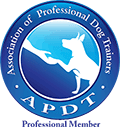Archived CF :: A Question of Dominance
As dogs and dog behavior have gained popularity in recent years, the topic of dominance has been ubiquitous in these discussions. It leads me to wonder why. Could it be that, with all the demands that we face in the rest of our lives, as employees and tax payers and upstanding citizens, we feel a bit trodden upon? And with the complexities of our other relationships, as family members and friends and lovers, maybe we'd like to attribute a simpler black-and-white characterization to our relationships with our dogs. In any case, if a dog has presumptuously promoted himself in the family structure, it seems justifiable to use retribution and punishment, settling for being our lesser selves, rather than exercising the understanding and patience of our better selves.
A great many dogs have a tendency to jump up on people during greeting. They pull on leash and rush through doors ahead of us. If given the opportunity, they'd happily gobble down their meal before we've even tucked ourselves into our seats. A dominance play? We have no problem assessing a loved one invading our personal space or pushing out the door first as rude, but give the family member fur and sharp canines and suddenly we see more sinister motives.*
Whatever our reasons, this wrestling that we're doing with the question of dominance is perhaps the single greatest threat to our relationships with our dogs. The things we do in the name of asserting our dominance mar the loving fabric we have woven together with them.
The Wolf Hierarchical Model
There has been a proliferation of reference to wolf behavior in modern dog behavior circles. The prevailing theories have been that wolves have strict, inflexible hierarchies with one alpha who controls all food sources and commands all pack movement and hunting. However, these theories are based on captive wolf packs; in fact, in wild packs, the responsibilities of the adult wolves of the pack are more evenly distributed and the relevance of rank has most to do with social interactions, promoting friendly relations and pack cohesion. Further, in wild packs, when food is scarce, the dominant pair chooses to whom to allot food, and it will usually be preferentially to their pups. But when food is plentiful, all will eat together, and each member has rightful ownership of resources within his "space", beneath his head and between his feet. Though another can try to steal or use intimidation to take the food, every wolf, regardless of rank, can rightfully defend his "stuff".
Still, our misinterpretation of wolf behavior has led us to insist on eating first, going out the door first, and relegating our dogs to the floor rather than the bed. While there are plenty of reasons to decide one practice over another, let's make sure we do it for the right reasons!
Being a Benevolent Leader to Your Dog
Mark Rashid, horse trainer and author of several books on the subject, observed social hierarchies and interactions in horse herds and saw two distinct types of leaders emerge. There were those horses who controlled herd movement and behavior through fear and intimidation and those who were chosen by other members of the herd as "passive leaders" because of their peaceful, cooperative practices. He noticed that this second kind of leader was more liked and trusted by the rest of the herd. Rashid teaches riders to emulate this same model of leadership when developing a bond with their horses.
This is a paradigm that we would do well to aspire to in our relationships with our dogs. We need for our dogs to understand that all the things that they value in their lives are generously granted by us. We control everything and will share richly, provided we are shown polite, respectful behavior.
To do this, take stock of the things that your dog considers valuable in his life: food, petting and affection, going for walks, playing with toys, being on the furniture, even chasing after a paper bag blowing in the wind or a squirrel scurrying up a tree. Require polite behavior from your dog in order to earn these life rewards:
- Ask for a wait before putting down his food or going out the door for a walk, obliging him to hold it until you release him.
- Play games together with rules: When playing with a toy, don't simply allow your dog to snatch it from your hands. Rather, ask for a sit, then offer the toy with a take it and have your dog relinquish the toy with a drop it.
- Incorporate obedience into your day. Ask for a watch while on a walk and then release him to chase a squirrel (just make sure he doesn't get it!). Teach your pup a leave it, which gives you control of the environment while also ensuring he can't grab harmful things from the sidewalk. Grant belly rubs or access to the couch for a sit, your dog's way of saying "please".
- Insist on four-on-the-floor at all times. Dogs establish leadership with each other by controlling the use of another dog's space. You can use your own body to control your dog's space -- leaning toward him even slightly applies pressure to his space that can prohibit him from breaking a down-stay and may also deter his jumping up on you.
- Teach your dog to loose-leash walk and hold a solid down-stay. These respectful behaviors enrich the ways in which we can share our lives with our dogs.
Our greatest challenge might be to leave the word dominance out of our vocabulary entirely. Still, our relationships with our dogs would undoubtedly be the better for it.
* Though not common, there is a behavior issue, once called dominance aggression but now more commonly referred to as noncompliance aggression or social aggression. This type of aggression is most often directed toward the dog's family members. So if your dog guards his food, possessions or space, such as the couch, and shows aggressive behavior with certain handling, such as collar grabs or when being restrained, enlist the assistance of a certified canine behavior counselor. Management and behavior modification protocols must be employed for the safe treatment of noncompliance aggression.




